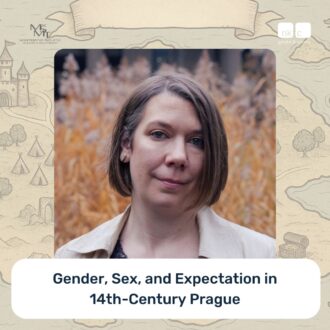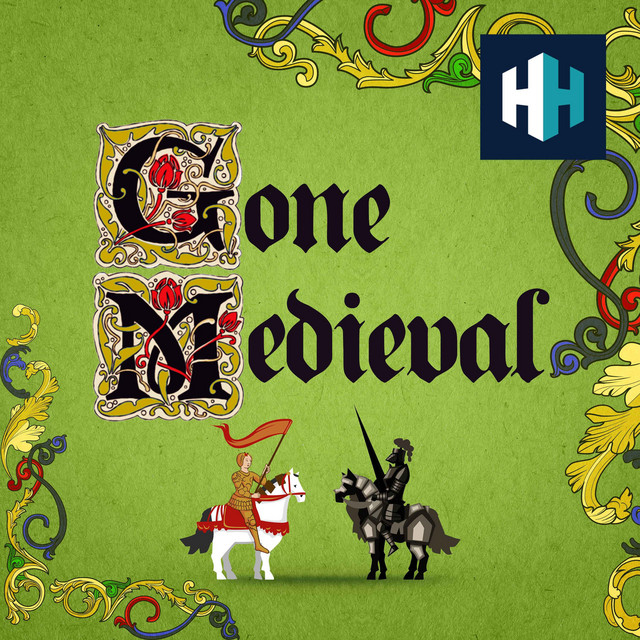
Gender, Sex, and Expectation in 14th-Century Prague. A Webinar on Gender Dimension in Research
The Centre for Gender and Science (NKC) organised a webinar entitled Gender, Sex, and Expectation in 14th-Century Prague on 25 June 2025, led by Dr. Eleanor Janega. The event formed part of NKC’s educational activities aimed at integrating the gender dimension into research within the Czech scientific community.
In this series of guest lectures, international experts present their work to promote the gender perspective in research and share best practices and examples relevant to Czech academia.
The guest speaker, Dr. Eleanor Janega, is a medieval historian specializing in gender and sexuality in the later Middle Ages, propaganda, apocalypticism, urbanity, and empire, in the late medieval and early modern periods, with a particular emphasis on Bohemia and the Holy Roman Empire. Dr. Janega holds a PhD in History and an MA in Medieval Studies from University College London, and a BA in History from Loyola University Chicago. She also hosts a podcast “Gone Medieval”.

In the lecture, Dr. Janega explored the perception of sex work and its implications for community membership in 14th-century Prague. She began by outlining the ancient philosophical foundations of gender norms upon which the medieval social principles and relations continued to build on, then she examined specific cases of sexual behaviour and their perception within local communities.
Her analysis was based on archdeaconry protocols, i.e. records of ecclesiastical visitations in which clergy and laypeople, questioned under oath, reported moral and religious transgressions. While these semi-judicial documents primarily served administrative purposes, they provide valuable testimony on communal disputes and breaches of moral norms, including sexual misconduct.
Drawing on insights from her recent book The Once and Future Sex, Dr. Janega highlighted how gender norms shaped perceptions of sexuality. For example, while men’s visits to brothels were tolerated if discreet, women engaged in sex work were considered a threat to household stability and faced social exclusion. Priests who violated sexual norms were judged differently again, as confession was sufficient enough to pardon them.
In the discussion following the lecture, participants also compared the situation in Prague with other medieval urban communities, such as Brno, where sex work was accepted as a source of tax revenue and women could reintegrate into society by marrying local men.
Why to include gender dimension in research?
When we talk about sex- and gender-sensitive research, many researchers assume it is sufficient to report how many men and women participated in a study. While this is an important first step, truly sex- and gender-sensitive research goes much further.
Dr. Janega’s lecture demonstrated that the gender dimension has an invaluable role across disciplines. Although there is still considerable scope for its application in medieval studies, which often rely on scarce sources, this example shows that incorporating a gender (and intersectional) perspective into research can reveal complex dynamics and the simultaneous realities and inequalities across categories such as gender, class, and, as in this case, the relationships between clergy and parishioners.
See the recording of the lecture below:
Speaker’s bio
Dr Eleanor Janega is a historian of the late medieval and early modern periods, with research interests centered on sexuality, propaganda, apocalypticism, urban life, and imperial structures. Her work interrogates the ways historical narratives are constructed and how they continue to shape contemporary cultural and social assumptions. Her research critically examines how medieval societies constructed and regulated gender roles, sexuality, and the female body, and how these narratives continue to inform contemporary understandings of gender.
She is the author of The Once and Future Sex, which critically examines the gendered expectations of women in medieval society, and The Middle Ages: A Graphic History, noted for its clarity and accessibility. Dr Janega first gained public recognition through her widely read blog Going Medieval and has since become a prominent public intellectual in historical scholarship. She co-hosts the podcasts Gone Medieval and We’re Not So Different, and regularly contributes to HistoryHit TV and leading media outlets. Originally from Tacoma, Washington, she is currently based in London.
This event is supported by the CZERA shared activities project funded by the Ministry of Education, Youth and Sports of the Czech Republic (identification code MS2103).
